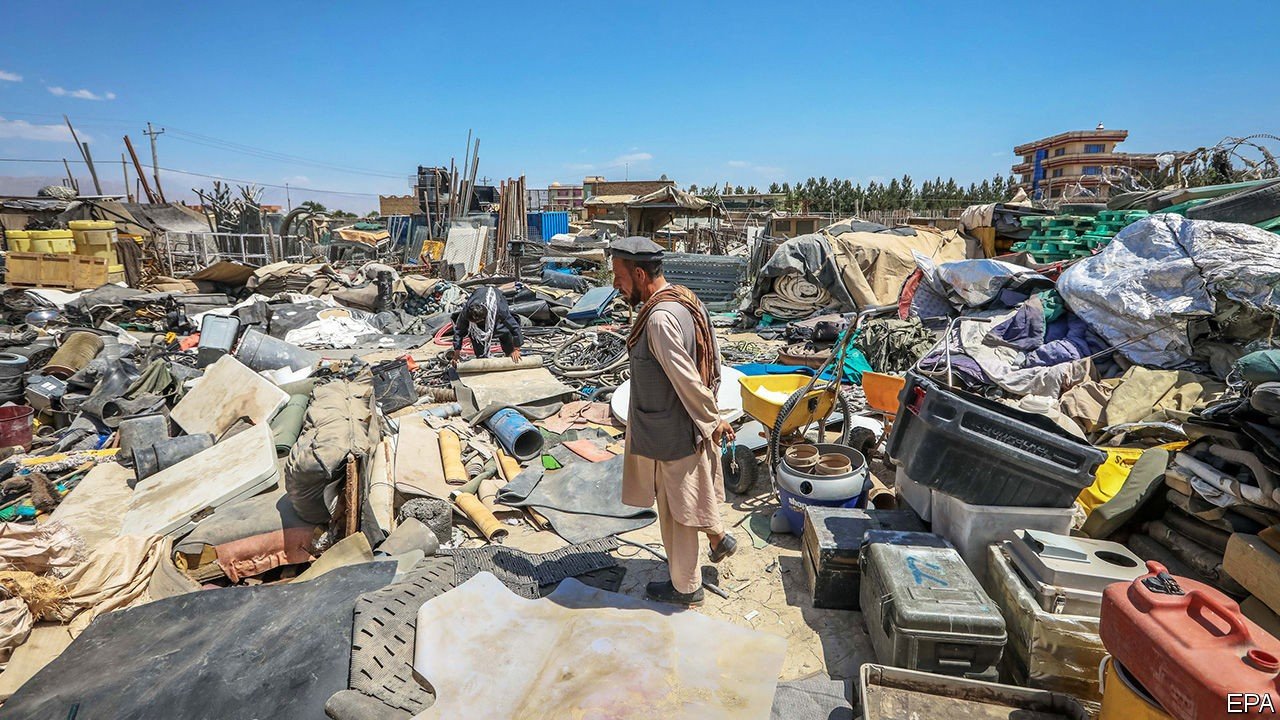WERE IT NOT for the Kalashnikov, the photograph would have been unremarkable. The framing is off-centre. The photographer’s shadow can be seen at the bottom. In the background is the western gate of Mazar-i-Sharif, just some 15km from the centre of Afghanistan’s fourth-biggest city. In the middle is a bored-looking man wearing typical local dress and an orange turban (pictured, below). It is the rifle he holds aloft in his right hand that gives him away as a member of the Taliban. That, and the caption that accompanied the picture as it pinged its way through the mobile phones of the city’s residents late last month: the Taliban are at the gates, it warned.

Panic swiftly swept the city. In the days before, district after district in the surrounding province of Balkh had fallen from government control and into the Taliban’s hands. Swathes of northern Afghanistan have in recent weeks suffered a similar fate. This was all the more alarming given that Balkh has a reputation as a bastion of anti-Taliban resistance. It is a long way from the insurgents’ southern heartlands. The sudden appearance of the gunman seemed an obvious signal that an assault was imminent. “On that day, everything closed and everyone went to their homes,” recalls Amir Mohammadi, an 18-year-old schoolboy in the city.
Less than three months after President Joe Biden declared that the last American troops would be out of Afghanistan by September 11th, the withdrawal is nearly complete. The departure from Bagram air base, an hour’s drive north of the capital, Kabul, in effect marked the end of America’s 20-year war. But that does not mean the end of the war in Afghanistan. If anything, it is only going to get worse.
America and its NATO allies have spent billions of dollars training and equipping Afghan security forces in the hope that they would one day be able to stand alone. Instead, they started buckling even before America left. Many districts are being taken not by force, but are simply handed over. Soldiers and policemen have surrendered in droves, leaving piles of American-purchased arms and ammunition and fleets of vehicles. Even as the last American troops were leaving Bagram over the weekend of July 3rd, more than 1,000 Afghan soldiers were busy fleeing across the border into neighbouring Tajikistan as they sought to escape a Taliban assault. “Everyone is shocked by how fast it’s fallen apart,” says a Western diplomat.
On paper, the Afghan army and police are more numerous and better equipped than their opponents. In reality they often yield to much smaller forces. Plummeting morale is a big reason. Troops complain of being abandoned by their commanders and of going without pay, food or ammunition. The American withdrawal has curtailed NATO air support, which the Afghan forces had come to rely on. Their own fledgling air force is a poor substitute.

A running tally by the Foundation for Defence of Democracies, a think-tank in Washington, estimates the Taliban control close to half the country’s 400-odd districts (see map). The government in Kabul strongly denies this and says any retreats have been temporary and will be reversed. Some districts have been retaken, or have changed hands several times. Many are remote and have little government presence or strategic importance. But the cascade of victories has given the Taliban momentum. Diplomats worry it will continue.
The Taliban have also made a slick propaganda push emphasising their seemingly relentless advance and showing that those who surrender are being treated well. Many Afghans are fed up with a corrupt and remote government that provides little benefit to citizens. They may not like the Taliban’s strictures, but they are not too keen on the current set-up either.
The feared push into Mazar-i-Sharif has so far not materialised. The army quickly released its own social-media pictures to show it had full control of the western gate. The city has begun to calm itself, but the government’s writ extends only a few miles outside it. Thousands of people from the countryside have poured into the city seeking refuge from the Taliban.
Murtaza Sultani, a 22-year-old driver from a nearby district, says his village fell in mid-June without a shot being fired. He left because the Taliban were seeking volunteers to join them. “Even if they don’t kill us, they restrict people and it’s no way to live,” he says. With no work, he passes the time in the courtyard of Mazar-i-Sharif’s majestic blue mosque: “I don’t have money to leave and the borders are closed.”
Leaving is a preoccupation for many. At the passport office in Kabul, thousands of Afghans are waiting in queues, sometimes for days, to acquire travel documents, either for immediate use or just in case. Many Afghans know from bitter experience what it means to be a refugee; they are not taking the choice lightly. Yet the sight of the near-unchecked Taliban advance is helping them make the decision.
“I want to go to Tehran,” says Jamaluddin Behboudi, a 34-year-old house painter squatting outside the passport office with his children. Iran, along with Pakistan, Turkey and Central Asia, is a popular choice for escape. But the pandemic has made travel difficult for everyone. In Mazar-i-Sharif itself, the deteriorating security situation has caused many countries, including Iran, to close their consulates.
As the outlook for the army and for civilians looks increasingly desperate, so do the measures proposed by the government. Ashraf Ghani, the president, is trying to mobilise militias to shore up the flimsy army. He has turned for help to figures such as Atta Mohammad Noor, who rose to power as an anti-Soviet and anti-Taliban commander and is now a potentate and businessman in Balkh province. “No matter what, we will defend our cities and the dignity of our people,” says Mr Noor in his gilded reception hall in Mazar-i-Sharif.
Such a mobilisation would be a temporary measure to give the army a breathing space and allow it to regroup, he says. The new forces would co-ordinate with government troops. But the prospect of unleashing warlords’ private armies fills many Afghans with dread, reminding them of the anarchy of the 1990s. Such militias, raised along ethnic lines, tended to turn on each other and the general population.
Matiullah Tarakhel, a soldier from the eastern province of Laghman, thinks the creation of militias is a power grab. “We have had experience of this,” he says as he queues for a passport for his sick father. “People have enemies. Maybe these militia men will want to kill their opponents, but they will say it was the Taliban.”
With America gone and Afghan forces melting away, the Taliban fancy their prospects. They show little sign of engaging in serious negotiations with Mr Ghani’s administration. Yet they control no major towns or cities. Sewing up the countryside puts pressure on the urban centres, but the Taliban may be in no hurry to force the issue. They generally lack heavy weapons. They may also lack the numbers to take a city against sustained resistance. On July 7th they failed to capture Qala-e-Naw, a small town. Besides, controlling a city would bring fresh headaches. They are not good at providing government services.
Seizing Kabul by force is “not Taliban policy”, Suhail Shaheen, a spokesman, told the BBC on July 5th. Their best course may be to tighten the screws and wait for the government to buckle. American predictions of its fate are getting gloomier. Intelligence agencies think Mr Ghani’s government could collapse within six months, according to the Wall Street Journal.
Amir Mohammadi, the teenager in Mazar-i-Sharif, says many of his contemporaries fear the future is bleak. “It looks like it’s going to get worse,” he says. “It’s better to leave.” That is much the same sentiment as in Washington.
Source: Economist



